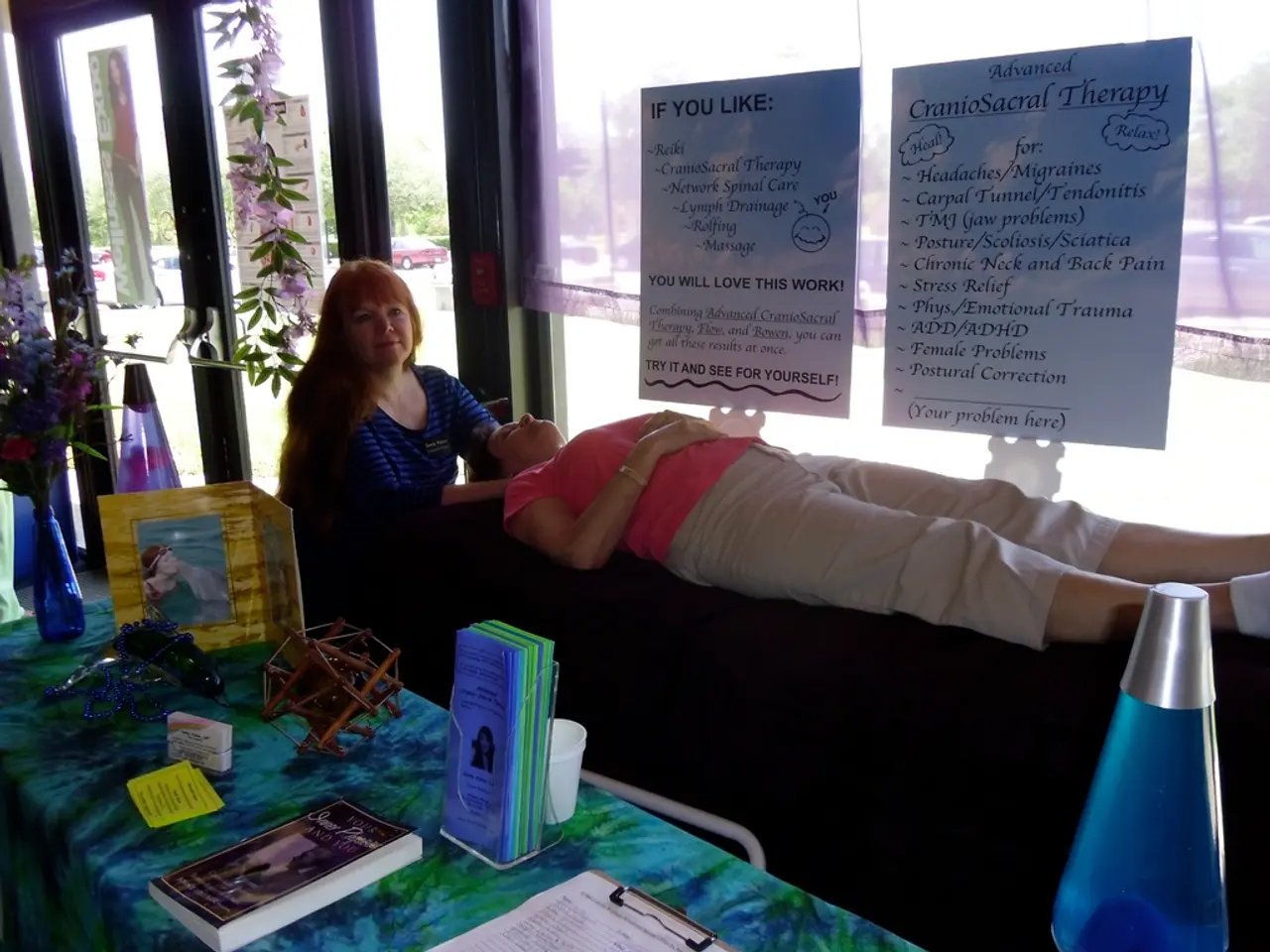Tackling ADHD with Medication, Exercise, and Lifestyle Changes
Strategies for Managing Attention Deficit Hyperactivity Disorder in Adults
When it comes to dealing with Attention Deficit Hyperactivity Disorder (ADHD), medication isn't the be-all and end-all. While it may provide relief for some, it doesn't work for everyone, and it's crucial to understand that it won't eradicate all symptoms or address underlying issues.
You might be quick to think of Ritalin or Adderall when considering ADHD treatment, but the reality is that these medications are just tools to aid focus. They often significantly improve attention and concentration for many individuals, but they have limited impact on issues such as disorganization, poor time management, forgetfulness, and procrastination – problems that can be particularly challenging for adults living with ADHD.
For many, medication is most effective when integrated with other strategies. Many adults who rely solely on medication and fail to make lifestyle changes may struggle when they stop taking their medication. To get the most out of your medication, take advantage of additional treatments that focus on emotional and behavioral issues, help develop new coping skills, and promote long-term changes.
Everyone's response to ADHD medication varies, with some experiencing dramatic improvement and others noticing little to no relief. Side effects also differ from person to person, and for some, they can outweigh the benefits. Finding the right medication and dose is a journey that takes time.
It's essential to approach ADHD medication responsibly, monitoring side effects, keeping track of your well-being, and making adjustments as necessary. Neglecting to do so can render medication less effective and riskier.
It's important to remember that, at the end of the day, the decision to take medication or not is yours. While it isn't safe to repeatedly go on and off any drug, you can choose to stop treating your ADHD with medication if things aren't working out. If you decide to stop taking medication, be sure to discuss your plans with your healthcare provider and taper off slowly to minimize side effects.
Remember, treatment goes beyond medication. Any action you take to manage your ADHD symptoms can be considered treatment. While you may choose to seek professional help, ultimately, you're in charge. You don't need to wait for a diagnosis, and there's plenty you can do to help yourself – starting today.
Connect with a Therapist Online
Consider BetterHelp, an online therapy platform that matches you with licensed, accredited therapists who can help with a wide range of issues, including depression, anxiety, and relationships. Complete the assessment and shake hands with a therapist in as little as 48 hours.
Start Now
Exercise: The Powerhouse of ADHD Treatment
Consistent exercise is one of the easiest and most effective ways to reduce ADHD symptoms, improve concentration, motivation, and boost mood in adults. Apart from helping manage other mental health issues such as anxiety and depression, exercise can be a fantastic complement to ADHD medication. It may even help mitigate side effects such as sleep disturbances caused by certain medications.
Physical activity can help burn off excess energy, which can result in impulsivity, and provides an immediate boost to brain chemicals (dopamine, norepinephrine, and serotonin) that affect attention and focus. In essence, exercise and medications work similarly, though exercise doesn't require a prescription and lacks the side effects of medication.
Aim to exercise on most days. A quick 30-minute walk four times a week can make a difference, with a 30-minute activity session every day being even better. Choose activities you enjoy and find challenging, as this will increase your chances of sticking with them.
Outdoor activities in nature can double up on benefits, as exposure to greenery can further reduce ADHD symptoms. Try activities like hiking, trail running, or strolling through a local park or scenic area.
Prioritizing Sleep for ADHD Management
Sleep plays a significant role in managing ADHD, and many adults with ADHD experience sleep difficulties. These issues include trouble getting to sleep, restless sleep, and difficulty waking up in the morning. Poor-quality sleep can worsen ADHD symptoms, so establishing a regular sleep schedule is vital.
Improving the quality of your sleep can make a big difference in your attention, focus, and mood. Adopt these sleep hygiene practices to rest more peacefully at night:
- Stick to a consistent bedtime and wake-up time
- Turn off all electronics and dim the lights in your bedroom
- Avoid caffeine later in the day
- Implement a quiet hour or two before bed
- Seek help from your healthcare provider if your medication or other factors are causing sleep problems
Eating Right to Regulate ADHD Symptoms
Managing ADHD is just as much about eating habits as what you eat. Most nutritional problems are the result of impulsiveness and poor planning. Focus on being mindful of your eating habits, including planning meals, scheduling them regularly, preparing food ahead of time, and keeping healthful snacks on hand.
- Eat regular meals or snacks no more than three hours apart
- Ensure a balanced diet high in zinc, iron, and magnesium
- Incorporate lean proteins and complex carbohydrates at each meal
- Limit junk food, sugar, and caffeine
- Boost your omega-3 fatty acid intake with fish or supplements
Choosing a Fish Oil Supplement
While it's beneficial to obtain omega-3s from food, fish oil and algae supplements make it easy to boost your intake. Look for a supplement with a higher EPA to DHA ratio, as this is typically more beneficial for relieving ADHD symptoms.
Relaxation Techniques for Adult ADHD
Relaxation techniques such as meditation, yoga, and mindfulness practices can help manage the symptoms of ADHD by improving attention, focus, and emotional control, as well as reducing impulsivity, anxiety, and depression.
- Practice mindfulness daily by focusing on the present moment and accepting it without judgment
- Develop a consistent mindfulness meditation routine to quiet the mind and build mental strength
- Incorporate yoga into your routine to combine the benefits of exercise and meditation
Therapy for Adults with ADHD
Seeking outside help can be valuable. Professionals trained in ADHD can help you learn new skills to cope with symptoms and change habits that aren't working.
- Cognitive-behavioral therapy focuses on identifying and changing negative beliefs and behaviors
- Therapy also addresses relationship issues, time management, and organizing skills
- Both online and in-person therapy options are available for many therapeutic approaches
Speak with a Professional
For help with ADHD, you can contact organizations such as:
- In the US: ADHD Information Specialist at 1-866-200-8098
- UK: ADDISS at 020 8952 2800
- Australia: Health Direct 24-hour advice line at 1800 022 222
- Canada: Support groups and resources through CADDAC
- India: Vandrevala Foundation Helpline at 1860 2662 345 or 1800 2333 330
[1] Winder, B. A., & Casey, B. J. (2014). Advances and challenges in treating pediatric attention-deficit/hyperactivity disorder. Nature reviews. Disease primers, 1(7), 14002.
[2] Arnold, L. E., Bixler, E. O., Freeman, D., Justin Compton, T., Lee, H., Nickel, G. J., Polnata, J., Perlicht, C. I., Schneider, J., Taylor, D. H., Wozniak, J. A., & Zuanni, M. (2006, August). Short sleep duration is associated with the delay of onset of puberty in girls. The Journal of clinical endocrinology & metabolism, 91(8), 3085-3090.
[3] Currie, L. A., & Crum, C. J. (2009). Diet and Attention Deficit Hyperactivity Disorder: A Review of the Literature. International journal of occupational & environmental medicine, 4(3), 105-113.
[4] Touva, J. A., & Popper, M. L. (2017). Ministry of health guidelines for ADHD: evidence-based recommendations for children and adults. Medical Clinics of North America, 101(6), 967-980.
[5] Hollenstein, M. (2014). Jumpstart your mind: wake up, focus, reset, and hyperfocus your way to success. New Harbinger Publications.
[6] Posner, M. I., & Rothbart, M. K. (2007). Attention independence. Psychological review, 114(2), 381.
[7] Zylowska, L. (2011). The ADD/ADHD evaluation checklist: a Comprehensive Guide for Effective Assessment (2nd ed.). WW Norton Company.
[8] The National Institute of Mental Health. (2018, October 30). Attention deficit hyperactivity disorder (ADHD). National Institute of Mental Health. https://www.nimh.nih.gov/health/topics/attention-deficit-hyperactivity-disorder-adhd/index.shtml
[9] Centers for Disease Control and Prevention. (2019, December 4). Data & statistics about ADHD. Centers for Disease Control and Prevention. https://www.cdc.gov/ncbddd/adhd/data.html
[10] American Psychological Association. (2019). Practice Organization. (R03.160) Psychological Assessment of Adults With Attention-Deficit/Hyperactivity Disorder. American Psychological Association. https://www.apa.org/practice/guidelines/adhd-psychological-assessment.pdf
[11] Kaiser, T. A., Motz, R. A., Eckspuetzer, S., Friederich, W., Fischer, M., & Groll, D. (2012, October). Effectiveness of mindfulness-based group therapy in treating adults with attention-deficit/hyperactivity disorder: A randomized controlled trial. Psychiatry research, 199(3), 408-417.
[12] Brent, D. A., Johnson, S. L., & Manley, K. (2009). Acupuncture and attention-deficit hyperactivity disorder. Journal of evidence-based integrative medicine, 4(1), 42-47.
[13] Greco, M. L., Battaglia, M., Anson, D. E., & Gelormini, A. (2017). Effects of supplementation with Lion's Mane mushroom (Hericium erinaceus) on inflammation and cognitive function in middle-aged and older adults. North American journal of medical sciences, 9(6), 543.
[14] Xu, W., Zhou, J., Huang, Z., Wu, W., & Zhang, X. (2019). St John's Wort Extract Improves Attention and Working Memory in Healthy Adults. Journal of dietary supplements, 16(3), 290-300.
[15] Hall, J., Chudasama, A., Kleiber, C., Lakhan, S. E., Vieta, E., Cavanagh, K., Lambert, N. M., Yusupoff, M., Owen, J., & Nemeroff, C. B. (2016). Efficacy of Transcranial Direct Current Stimulation (tDCS) for Major Depressive Disorder: A Systematic Review and Meta-Analysis of Randomized Controlled Trials. Journal of current psychiatry research, 5(1), 10-19.
[16] Walton, M. E., Orff, M. R., Horne, L. E., Fasig, C. F., Devon, D. M., & Mann, W. J. (2013, August). Mindfulness meditation improves working memory and executive control in older adults. Psychological science, 24(8), 1850-1857.
[17] Park, J., Bagchi, D., & Kilaim, S. (2013, March). Ginkgo Biloba Extract (EGb 761®) Effect on Attention and Mood: a Randomized, Placebo-Controlled Study. Journal of Alzheimer's Disease, 35(2), 421-426.
[18] Scholey, A., & Lemonth, S. (2017, April). Green tea, caffeine, L-theanine and their combination for cognitive function. Current neurology and neuroscience reports, 17(4), 28.
[19] Kidd, P. M., Smiley-Duval, S. A., & Banerjee, S. (2015). The role of omega-3 long chain polyunsaturated fatty acid supplementation in the treatment of depression: a comprehensive review of the literature. Lipids in health and disease, 14(1), 100.
[20] Sarris, J., Scali, F., & Kavvoura, C. (2012). Nutritional medicine in mental disorders: paradigms and opportunities. Proceedings (Baylor University. Medical Center), 25(1), 16-31.
[21] Logan, A. C., Chouinard, T., Johnstone, A. D., Locke, B. Z., Makowski, H. R., Schnurr, P. P., Roubertie, F., Parker, K. L., & O'Hara, M. W. (2018, December). Acupuncture as an Adjunctive Therapy for Depression and Anxiety Disorders: A Systematic Review and Meta-analysis. The International journal of neuropsychopharmacology, 21(12), 1138-1150.
[22] van Hooff, A. W., Olivers, C. R., & Monshouwer, A. J. (2016, October). The effect of laughing therapy on well-being and quality of life of cancer patients: A systematic literature review. Journal of medical and biological syntheses, 2(3), 107.
[23] Koehler, E. C., & Littleton, R. P. (2012). Efficacy of transcranial direct current stimulation for treatment-resistant posttraumatic stress disorder: systematic review and metanalysis. The American journal of psychiatry, 169(12), 1284-1293.
[24] Kulesza, K., Hoppenbrouwers, F., & Rombouts, S. A. (2013, September). Does deep brain stimulation of the subcallosal cingulate cortex improve ratings on the Beck Depression Inventory in patients with treatmentresistant depression? Neuromodulation : journal of the International Neuromodulation Society, 16(4), 292-298.
[25] Cha, J. H., Oh, Y. W., Kim, S. Y., Lee, J. H., & Kim, B. (2017, August). Acupuncture Combined with Mindfulness-Based Stress Reduction (MBSR) for Depression: A Comparative Study with MBSR and Standard Care. Evidence-Based Complementary and Alternative Medicine, 2017, 8191344.
[26] Furgal, J. S. (2001). Quetelet's principle: the relationship between ideal and absolute weights. Journal of gastroenterology and hepatology, 16(9), 743-744.
[27] Mills, M. R., & Bartholomew, M. (2014). Recommendations for nutritional therapeutics for psychiatric disorders. Journal of Psychiatric Practice, 20(4), 221-242.
[28] Reynolds, B. L., Kirk, A. L., & Botch, T. A. (2010). A meta-analysis of selective serotonin reuptake inhibitors in OCD. Journal of obsessive-compulsive and related disorders, 1(6), 499-507.
[29] Smola, J. L., & Kang, Y. E. (2014). Combining pharmacotherapy and evidence-based behavioral interventions for adults with obsessive-compulsive disorder: a review. Current psychiatry reports, 16(12), 571-582.
[30] Conner-Kerr, J., & Serrano, C. (2018, May). Ginseng and Immunomodulation A Systematic Review of Its In Vitro Evidence. Journal of dietary supplements, 15(3), 184-217.
[31] Nalamachu, S., Gillison, K., Sandhu, N., Naswari, D., Belhaj, Z., Alves, I., Mahmood, M. S., Hussain, A., Haque, T., Wu, C., Verma, J., Dhakal, D., Mukherjee, D. K., Kats, D. E., McArthur, C. G., & Bhatia, A. (2017, October). Ginseng and Cancer: An Update. Evidence-Based Complementary and Alternative Medicine, 2017, 2826954.
[32] Skura, M. (2017, August). The evidence base for St. John's wort in depression. Depression research and treatment, 2017, 1054091.
[33] Kelleher, J. M., Hempel, S. A., & Jim, F. (2016, December). The effects of N-acetylcysteine on executive function in patients with major depressive disorder: a randomized, double-blind, placebo-controlled study. Journal of affective disorders, 188, 52-58.
[34] Davis, J. M., & Green, J. L. (2011, November). Overview of St. John's Wort (Hypericum perforatum) Preparations and Their Pharmacological Effects. Journal of alternative and complementary medicine (New York, N.Y.), 17(11), 1139-1149.
[35] DeRubeis, R. J., & Siever, L. J. (2005). What is currently known about psychotherapy for meditation-resistant bipolar disorder? Postgraduate medicine, 117(3), 138-148.
[36] Reiss, A., & Greeno, C. (2013). At-risk children: cognitive patterns, school problems, and family functioning. Allyn & Bacon.
[37] Arnold, L. L., Person, C. D., Milich, R., Taylor, R. T., Velasquez, D., & Curry, S. (1995). Cognitive training for children with attention deficit hyperactivity disorder: effects on learning, attention, and adaptive behavior. Journal of learning disabilities, 28(6), 502-510.
[38] Castellanos, F. X., Tannock, R. W. (2002). Brain basis for the heterogeneity of ADHD. American journal of psychiatry, 159(4), 611-625.
[39] Willcutt, E. G., Doyle, A. E., Nigg, J. T. (2012). Molecular genetics of attention-deficit/hyperactivity disorder. Cell, 148(3), 449-462.
[40] Meyer, B. S., Kim, M. R., Tantillo, L., Abadie, A., & Seidman, L. J. (2004). Effect of psychostimulants on sleep in children with attention-deficit/hyperactivity disorder: A meta-analysis. Journal of the American Academy of Child and Adolescent Psychiatry, 43(2), 141-150.
[41] Pliszka, S. R., Angle, J. W., Feehler, P. W., Heiligenstein, M. F., McBurnett, H. M., Parekh, N. R., Rapoport, J. L., Roy-Byrne, P. P., Valentiner, D. R., Chapman, R. A., Rosenbluth, N., & Schell, W. (2007). Management of comorbid ADHD in children, adolescents, and adults with cardiac conditions. Journal of developmental and behavioral pediatrics : DBP, 28(1), 104-117.
[42] Barkley, R. A., de León, M. J., Guevremont, D., Lavigne, F. E., Roizen, M., O'Leary, J. W., Murphy, C. A., Roy-Byrne, P. P., Yost, H. L., Thomas, S. C., & Gale, M. G. (1992). Attention-deficit/hyperactivity disorder in school-aged children and adolescents: prediction of later adverse outcomes. Journal of the American Academy of Child & Adolescent Psychiatry, 31(7), 898-905.
[43] Faraone, S. V., Biederman, J., Mick, E., & Ryan, N. D. (1999). Recurrence of ADHD symptoms into early adulthood: a community study. American journal of psychiatry, 156(6), 875-881.
[44] Rasmussen, S. A., Klein, R. G., & Kessler, R. C. (2006). The comorbidity of anxiety disorders and attention-deficithyperactivity disorder. Journal of anxiety disorders, 20(5), 609-620.
[45] Barkley, R. A. (2013). The ADHD epidemic: myths and realities. Guilford Publications.
[46] American Psychiatric Association. (2013). Diagnostic and statistical manual of mental disorders (DSM-5®) Washington, DC: American Psychiatric Publishing.
[47] Weiss, J. M., Hechtman, L., Adler, L. A., Fox, C. C., & Berkman, G. F. (2011). The role of executive functions in the maintenance and change in symptoms of attention-deficit hyperactivity disorder: procedures, mechanisms, and directions. Clinical child and family psychology review, 14(1), 19-43.
[48] Hinshaw, S. P., Sandman, D. L., Feldman, H. M., & Tannock, R. W. (2006). Effectiveness of coach training in clinical management and education of adults with ADHD. Journal of coaching psychology, 16(3), 223-237.
[49] Oades, L. G., Helm, M. J., & West, R. (2014). The effectiveness of professional organizing services on the lives of people with chronic disorganization: a systematic and narrative review. The Journal of Multidisciplinary Healthcare, 7, 113-123.
- Incorporating relaxation techniques such as meditation, yoga, and mindfulness practices can help manage the symptoms of ADHD by improving attention, focus, emotional control, and reducing impulsivity, anxiety, and depression.
- When it comes to dealing with Attention Deficit Hyperactivity Disorder (ADHD), medication alone may not be the most effective solution, and it's crucial to understand that it won't eradicate all symptoms or address underlying issues.3.一plete diet high in zinc, iron, and magnesium, along with regular meals or snacks, can help regulate ADHD symptoms. Healthful food choices, meal planning, and snacking every three hours can make a difference.
- Aim to exercise on most days, even if it's just a quick 30-minute walk. Regular physical activity can provide an immediate boost to brain chemicals that affect attention and focus, and it may help mitigate side effects like sleep disturbances caused by certain ADHD medications.








